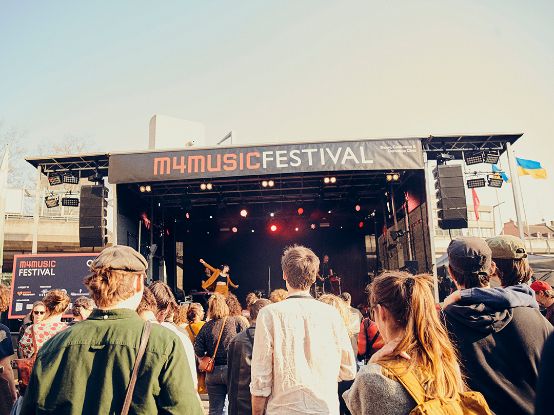m4music: A digital push towards sustainability
After a two-year hiatus, the m4music music festival once again took place on location and with an audience in Zurich. The meeting of the Swiss pop scene attracted around 1,300 professionals and 4,000 music fans and is set to remain a "place of consolidation".

While m4music, the pop music festival organized by Migros Culture Percentage, fell victim to the coronavirus pandemic in 2020, the event, including its demo tape clinic and various panels, went digital the following year. "That worked surprisingly well," recalls Festival Director Philipp Schnyder von Wartensee. Nevertheless, he is relieved that m4music was able to take place live and on site in Zurich again this March.
Unlike in previous years, the festival was not opened in Lausanne. "Instead, we will be holding an event at Couleur 3 in May with artists such as Evelinn Trouble and Giulia Dabalà," explains Schnyder in an interview after the festival. It is also a clear indication that the festival wants to increase its presence during the year in future - including in French-speaking Switzerland. The pandemic has also prompted the m4music organizers to think about the festival in general. "We decided to stick with m4music as a place of consolidation. However, the coronavirus has given us a digital boost. Among other things, this has led us to say goodbye to various printed materials."
In any case, m4music has set itself the goal of becoming more sustainable. "This year we became a vegetarian festival. We also asked ourselves whether we wanted to continue flying people in for our program and the conference. Our answer: only in an emergency." According to the festival director, topics such as the climate and racism have become more urgent in the last two years. "We want to incorporate this into the conference." Consequently, "cultural appropriation and music" and "green touring" were also discussed at this year's festival.
With jazz for the first time
A total of around 4,000 music fans and 1,300 professionals took part in m4music on March 25 and 26. "The number of professionals was even higher than in the pre-corona years. We see this as proof of how great the need was in the music scene to be able to meet physically again," emphasizes Schnyder. Another new topic at m4music was jazz. "We had already planned to focus on young jazz in particular in 2020. But due to the pandemic, the whole thing had to wait." This year's program included a panel entitled "New jazz - a breath of fresh air and no limits". This brought together the director of the Willisau Jazz Festival, Arno Troxler, the founder of the Hamburg Elbjazz Festival, Tina Heine, and musician Benedikt Wieland, who is responsible for international affairs and social security at Sonart - Musicians Switzerland.
Presenter Stefan Künzli's thesis was that young musicians such as Jordan Rakei, Jorja Smith and Loyle Carner are increasingly dissolving the genre boundaries of jazz by mixing it with hip-hop, soul, indie or electronic music. While Troxler insisted that jazz has always known how to present itself in an extremely diverse way and is by no means just for older men, Wieland emphasized that it was high time to stop throwing around terms. "Such things must be overcome with music." Heine, Director of the Salzburg Jazz & The City festival since 2016, focused on visitors aged between 15 and 80: "They are welcome to find the music at our festival 'grotty' from time to time." Her primary concern is that people get up from their sofa at home and come together at concerts.
Streaming influences songwriting
Meanwhile, a panel presented by Suisa wanted to find out how music streaming changes the pop song, especially on a portal like Spotify, where 65,000 songs are uploaded every day and it is therefore essential to give your songs a unique selling point - otherwise they risk getting lost in the crowd. "My rule is that there has to be something new in my songs every eight seconds," said songwriter and producer Loris Cimino. At the same time, he emphasized: "The quality of the craft has to be right."
Singer/songwriter Evelinn Trouble believes that songwriting on Spotify "is not crucial: a good song is still a good song." However, she has started to write increasingly shorter songs. Henrik Amschler, alias HSA, said that his aim was for something to happen as quickly as possible in his songs. Meanwhile, Julie Born, Managing Director of Sony Music Switzerland, emphasized the increasing relevance of playlists on Spotify. To summarize, the following still seems to apply: There is no single path to success - however, the paths that are supposed to lead to career success seem to be increasingly convoluted.
The panel "How Streaming Is Changing Songwriting" can be followed under the following link: www.m4music.ch/conference
Awards
The main prize "Demo of the Year" 2022 went to Soukey from Bern. It also received one of the four Fondation Suisa Awards. The other three went to Goffbaby, David Caspar and Glaascats.
The production of the song Driver by Joya Marleen by the directing duo Bastien Bron and Laetitia Gauchat ("Das Playground", Neuchâtel) was awarded the "Best Video Clip 2022" (jury and audience award for the first time!).
The next m4music-Festival will take place on March 24 and 25, 2023 in Zurich.








